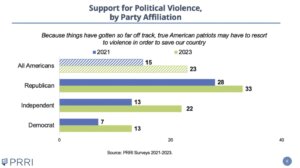Can American Jews stop demonizing each other?
The point isn’t to agree — it’s to disagree with reality, rather than with caricature

PRRI Survey Graphic by PRRI
As I circled around my sukkah this Hoshana Rabba, when according to rabbinic teaching the gates of repentance close for good, I prayed that Kamala Harris would win the election.
To be sure, I don’t believe in petitionary prayer, and I don’t believe that God intervenes in human history. I believe that human beings will elect the next president of the United States entirely on their own.
But, hey, you never know, right?
I am, of course, aware, that many other Jews are praying for the opposite result. Indeed, given Donald Trump’s strength among Orthodox Jews, there are probably more Jews praying for him to win than praying for Harris, especially on Hoshana Rabba, one of the more obscure Jewish holidays. So, I’m praying they lose, they’re praying I lose. This is how it is.
Yet 2024 is also not the same as before, because each side of today’s political divide has wild fantasies about the other: that they are insane, deluded, stupid, sheeplike, tolerant of antisemitism and bad for Israel. Go ahead: imagine a Trump supporter saying it about a Harris supporter… and then imagine the reverse. Funny how that is.
True, there’s not symmetry in how the two candidates have conducted themselves: Trump has said that Jews who vote for Democrats (as between 65-75% of American Jews generally do) “hate their religion.” Harris has said no such thing about Jewish Republicans. But I have had plenty of private conversations in my blue bubble with ordinary liberal folks who cannot fathom how any Jewish person could vote for Donald Trump.
This is not good civics. We need to understand the “other side” as they understand themselves — not as benighted, naïve, self-haters or insane, racist neanderthals (or, for that matter, as antisemitic supporters of terrorism or racist supporters of genocide), but in ways they can recognize themselves. This isn’t so we can all agree, but so we can all disagree meaningfully.
So that’s what I’m going to try to do now. I’m going to explore the Jewish cases for and against Trump as they might understand themselves, not for the already committed but for those who may be wavering, or unsure, or somewhere in the middle. Which, I think, is a lot of us.
The strongest Jewish case for Trump is a hawkish, pro-Israel case. If you believe (as I do not) that Israel’s actions in Gaza are entirely justified, reasonable, and necessary to keep Israel safe, then you might be dismayed by the Biden administration’s efforts, however limited, to bring about a ceasefire and pressure Israel to let in humanitarian aid. Benjamin Netanyahu is a democratically-elected leader, and perhaps what America should be doing is support Israel, no questions asked and no strings attached.
It is likely, as I’ve written before, that Donald Trump will do just that. According to media reports, Miriam Adelson has donated over $100 million to Trump’s campaign in the hopes (or expectation) that he will allow Israel to annex the West Bank and to prosecute the war in Gaza indefinitely, regardless of the cost to Palestinian human life.
But, if these are your politics — again, they are not mine — you have a difficult choice to make. On the one hand, Trump will be better for Israel, in this conception of what is good for Israel. On the other hand, Trump brings with him an array of problematic people and policies, from a Jewish point of view: Christian nationalists, an array of policies meant to strengthen the place of conservative Christianity in American life, and prominent supporters including white supremacists, antisemites, and holocaust deniers (including Tucker Carlson, who applauded holocaust denial on his podcast). And then there’s his movement’s seething rage against “enemies of the people” and “coastal elites,” many of whom just to happen to be Jewish. And all the other reasons someone might have misgivings about him.
Is this bargain — or risk — worth it? Obviously, I don’t think that it is. Hearkening back to the story of Jacob and Esau, I’ve described it as selling the birthright of the Jewish American dream for a pot of territorial porridge. But of course, I don’t face this difficult choice, because I think Trump’s policies are bad for Israel anyway. I don’t have to choose between ‘best for Israel’ and ‘best for America and/or American Jews’ because I think Trump is terrible for each. So it’s easy for me to say.
In any case, it’s possible to strongly oppose everything Trump stands for (as I do) without caricaturing his Jewish supporters in the ways that are common on the Left. If I sincerely believed that the survival of the Jewish state depended on it, I might also put up with Trump’s many personal and political flaws, and the danger he presents to the America I’ve grown up in. Maybe not, but maybe.
Conversely, if one does support Trump, one surely should not believe, or repeat, the vitriolic disinformation coming from his campaign and supporters. For example, a commenter on a post of mine recently asked, rhetorically, “Are we supposed to support Kamala Harris, funded by the Muslim Brotherhood?” That is a conspiracy theory with zero basis in reality. And Trump himself has said that Harris, whose husband is Jewish, “doesn’t like Jewish people.” That is outrageous.
So are the repeated statements from Republicans that Harris is somehow capitulating to “the Hamas wing of the Democratic party.” What? In fact, Harris is in danger of losing Michigan because of not ‘capitulating’ to Muslims and Arab-Americans who have demanded that the Biden administration take a stronger stance against Israel’s actions in Gaza. If Harris had capitulated to them, they wouldn’t be voting for Jill Stein, for God’s sake.
It’s also slanderous to equate concern for a million innocent Palestinian lives — something 57% of Americans express — with support for Hamas. Yes, some percentage of pro-Palestine protesters do support Hamas, and I find that morally deplorable. But claiming that there exists a ‘Hamas wing’ of the Democratic party is offensive to millions of people who abhor Hamas and also abhor the brutal nature of the Gaza war.
Just as it’s possible to oppose Trump without slandering all his supporters, it’s possible to support Netanyahu’s policies without unfairly caricaturing those who oppose them.
In fact, the large majority of American Jews support Kamala Harris for any number of reasons. Some may not be particularly Jewish, like Trump’s past and future threats against fair elections, his apparent cognitive failings, women’s rights to their own bodily integrity, understanding the science of global warming, a desire for sensible gun laws, loathing of Trump’s serial sexual assaults and acts of fraud, and hundreds more. (I made a list of my top 14 concerns about a Trump presidency here.)
And some reasons may be specifically Jewish, like not wanting to give a blank check to Israel’s extreme nationalist right, which will lead to the the degradation of Israeli democracy and appalling oppression of Palestinians; or opposing the rise of Christian Nationalism, which is opposed to everything that has enabled American Jews to prosper here for the last century; or fearing the continued degradation of our “discourse” around antisemitism, which has now enflamed Jewish fears and paranoias and turned us against one another; and the overall rise in right-wing conspiracy theories, which always come around to antisemitism eventually.
None of this amounts to antisemitism, self-hatred or naivete. As a rabbi, professor and journalist, I am obviously quite aware of antisemitic rhetoric on the Left; I’ve been the target of it. Yet as I’ve argued many times in these pages, this pales in comparison to right-wing antisemitic violence, and right-wing antisemites’ proximity to power. I legitimately believe that, even if antisemitism were one’s central concern in the 2024 election, Harris is by far the better choice. Mainstream democrats have continually condemned antisemitism on the Left – Trump refuses to do so with regard to antisemitism on the Right. On the contrary, he said back in 2017 that people who march with Neo-Nazis may be “very fine people” (not the neo-Nazis themselves, but their comrades in arms). Fine people do not march with Nazis.
Nor is this a one-time mistake. While Trump has many Jewish friends and family members, he cannot or will not acknowledge the linkage between his America First nationalism – the same phrase used by American Nazi sympathizers in the 1930s – and the antisemitism within his own movement. He scapegoats George Soros like Big Brother scapegoats Emmanuel Goldstein. He traffics in antisemitic tropes about Jews and money. He blames elites who control the media, finance, and politics – a reckless foray into antisemitic conspiracy-mongering. And he has lately suggested that Jews should be blamed if he loses the election.
I’ve been called many things in my career, and that comes with the territory. But mainstream Jewish voices deriding progressives for being either blind to antisemitism or antisemites ourselves – this is a bridge too far, and the people making this charge, though they may be well-funded “independents” with larger followings than mine, should do some serious introspection.
Finally, while I’ve tried to show that both sides could be more civil in describing one another, it would be foolish to equate the two. There’s no Harris equivalent of Trump’s attacks on Jews who vote for Democrats. There’s no Harris equivalent of Trump’s pledge, on November 11, 2023, to “root out the communists, Marxists, fascists and the radical left thugs that live like vermin within the confines of our country” or his statements that immigrants are “poisoning the blood” of America, yet another phrase taken verbatim from Nazi rhetoric. And there’s no equating support for political violence between the two parties – here’s what a 2023 survey by PRRI found:

So, yes, both sides should be doing better at disagreeing with one another. Both sides could tone down the rhetoric and the assumptions about what others believe. But facts are also facts, and the two sides are not equivalent in the way they have incited rage and sheer meanness among their supporters.
As American Jews head to the polls, this, too, should give us pause.
















